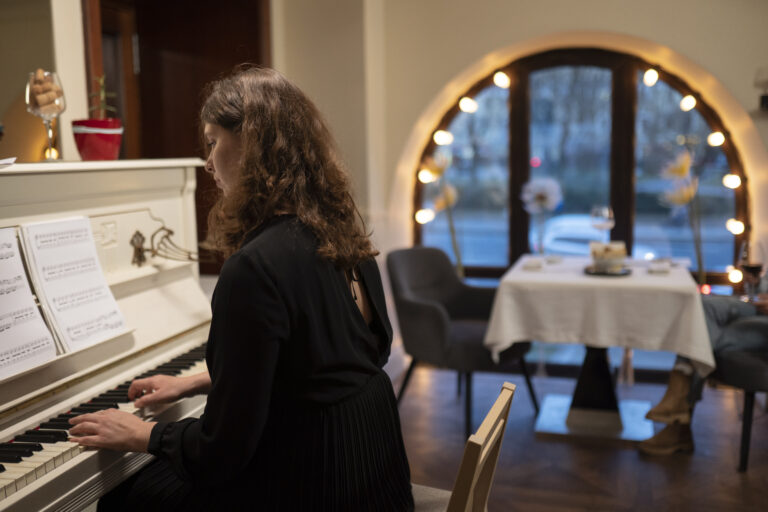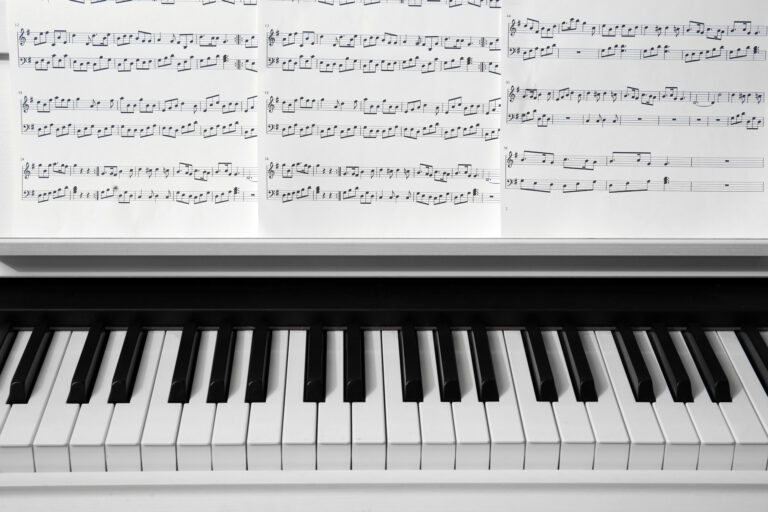Unlocking the Dreamland Symphony: How Piano Music Influences Sleep Quality
Enter the realm of tranquillity and serenity, where the timeless melody of the piano holds the key to a peaceful night’s slumber. The struggle to find rest amidst the quiet of the night is a familiar tale, a journey that many embark upon in search of solace. Yet, amidst the shadows of sleepless nights, a glimmer of hope emerges, beckoning with the promise of a natural remedy.
Imagine the gentle embrace of the piano’s harmonies, a soothing balm for the restless mind and weary soul. As the keys yield to the touch of your fingertips, a symphony of tranquillity unfolds, casting a spell of calm upon the tumultuous waves of sleeplessness. Studies whisper tales of the piano’s enchanting power, revealing its ability to lull the mind and body into a state of peaceful repose.

The act of playing the piano becomes a sanctuary of concentration and focus, a refuge from the relentless storm of racing thoughts and anxiety. Within the intricate dance of melodies and harmonies, the mind finds respite, and the heart finds solace. The rhythmic cadence of the piano’s song becomes a gentle lullaby, guiding the restless spirit into a realm of meditative tranquillity, where breathing slows and the heart finds its steady rhythm.
So, dear seeker of restful slumber, as we embark on this journey of musical discovery, let us embrace the promise of the piano’s calming embrace. Let us unravel the mysteries of its tranquil melodies and the soothing balm it bestows upon the weary soul. For within the hallowed halls of music, a symphony of solace awaits, inviting you to find respite in the gentle embrace of the piano’s timeless melody.
The Science of Music and Sleep

Effects of Piano Music on the Brain
Research has shown that listening to calming music, such as piano music, before bedtime can help you fall asleep faster and improve the quality of your sleep. This is because music has a direct impact on the brain and can alter brainwave patterns, inducing a state of relaxation.
A study conducted by the University of Toronto found that listening to classical music, including piano music, for just 45 minutes before bedtime can significantly improve sleep quality. The study also found that participants who listened to music experienced less anxiety and had lower levels of cortisol, a stress hormone that can interfere with sleep.
Music Tempo and Sleep Quality
The tempo of music can also have an impact on sleep quality. Slow, calming music with a tempo of around 60-80 beats per minute is most effective in inducing relaxation and promoting sleep.
Piano music is often composed with a slower tempo, making it an ideal choice for calming bedtime music. Many popular piano pieces, such as “Clair de Lune” by Debussy and “Moonlight Sonata” by Beethoven, have a tempo of around 60-80 beats per minute.
Incorporating soothing piano music into your bedtime ritual could potentially enhance the quality of your sleep and foster a sense of relaxation. Yet, it’s essential to recognize that individual responses to music vary, and what proves effective for one person may not yield the same results for another.
Benefits of Piano Music for Sleep

If you’re having trouble sleeping, piano music might be just what you need to help you drift off. Here are some of the benefits of listening to piano music before bed:
Stress ReductionThe Dark Side of Piano Playing: Can it Actually Cause Stress?
Listening to piano music can help reduce stress and anxiety, which can make it easier to fall asleep. The slow, soothing melodies can help calm your mind and relax your body, making it easier to let go of any worries or tension from the day.
Sleep Pattern Improvement
Piano music can also help improve your sleep patterns. Studies have shown that listening to calming music before bed can help you fall asleep faster and stay asleep longer. This can lead to more restful, restorative sleep, which can leave you feeling more refreshed and energized in the morning.
To get the most out of piano music for sleep, try creating a calming bedtime routine. Set aside some time before bed to listen to your favourite piano pieces, and pair them with other relaxing activities, such as taking a warm bath or practising gentle yoga stretches. With a little practice, you may find that piano music becomes an essential part of your nightly routine, helping you get the restful sleep you need to feel your best.
Creating a Sleep-Inducing Environment

When it comes to using the piano to help you sleep, creating the right environment is key. Here are a few tips to help you create a sleep-inducing environment for yourself:
Playlist Selection
Choosing the right playlist is crucial for a good night’s sleep. You want to select music that is calming, soothing, and relaxing. Avoid music with a fast tempo, loud volume, or sudden changes in volume or tone. Some good options include classical piano music, ambient music, or nature sounds.
Volume and Timing
The volume and timing of the music you listen to can also have a significant impact on your ability to fall asleep. You want to choose a volume that is soft enough to lull you to sleep but not so soft that you can’t hear the music. Additionally, you want to time your music so that it plays for the duration of your sleep. This will help you stay asleep and avoid waking up in the middle of the night.
Establishing a sleep-inducing environment is vital when using the piano to aid in sleeping. Through careful selection of the playlist, as well as adjusting the volume and timing of the music, you can craft a tranquil and calming ambience conducive to a restful night’s sleep.
Comparative Analysis

Piano vs. Other Instruments
When it comes to musical instruments, many people wonder which one is the best for promoting sleep. While all instruments have the potential to create relaxing sounds, the piano has some unique advantages.
Firstly, the piano has a wide range of notes, which allows for a greater variety of sounds and melodies. This can be especially helpful for those who find repetitive or monotonous sounds to be distracting. Additionally, the piano is a percussive instrument, meaning that its sounds have a distinct rhythm and pulse. This can help to regulate breathing and heart rate, promoting a sense of calm and relaxation.
Comparatively, other instruments such as the guitar or flute may not have the same range of notes or rhythmic qualities. However, it is important to note that personal preference plays a large role in determining which instrument is best for promoting sleep.
Piano Music vs. White Noise
Another common sleep aid is white noise, which is a consistent, low-level sound that can help to mask other noises and promote relaxation. While white noise can be effective for some people, others may find it to be monotonous or irritating.
Piano music, on the other hand, has the advantage of being more dynamic and expressive. This can create a more engaging and enjoyable listening experience, which may make it easier to fall asleep. Additionally, piano music can be customized to suit individual preferences, such as choosing specific genres or artists.
Overall, both piano music and white noise can be effective for promoting sleep, depending on personal preference and individual needs. It is important to experiment with different options and find what works best for you.
Practical Tips for Incorporating Piano Music into Your Routine
If you’re interested in incorporating piano music into your sleep routine, here are a few practical tips to get started:
- Create a playlist: Consider creating a playlist of relaxing piano music that you can listen to before bed. This can help signal to your body that it’s time to wind down and prepare for sleep.
- Experiment with timing: Try listening to piano music at different times throughout the day to see what works best for you. Some people find that listening to music in the morning helps them start their day off on the right foot, while others prefer to listen in the evening to help them unwind.
- Pair music with other relaxation techniques: Pairing piano music with other relaxation techniques, such as deep breathing or meditation, can help enhance its effects and promote better sleep.
- Invest in quality headphones or speakers: Investing in quality headphones or speakers can help you fully immerse yourself in the music and create a more relaxing environment.
- Avoid stimulating music: When selecting piano music to listen to before bed, avoid choosing pieces that are too stimulating or upbeat. Instead, opt for slower, more calming pieces that can help you relax and unwind.
Incorporating piano music into your sleep routine can be a simple yet effective way to promote better sleep and relaxation. By experimenting with different techniques and finding what works best for you, you can create a personalized routine that helps you get the restful sleep you need.






